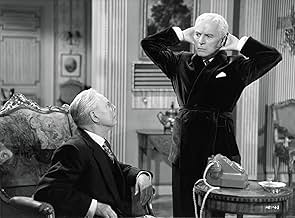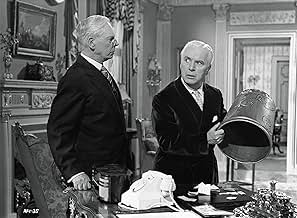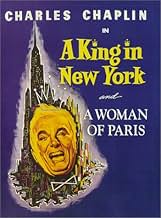VALUTAZIONE IMDb
7,0/10
9148
LA TUA VALUTAZIONE
Un monarca europeo recentemente deposto cerca rifugio a New York City, dove diventa una celebrità televisiva accidentale e in seguito viene accusato ingiustamente di essere un comunista.Un monarca europeo recentemente deposto cerca rifugio a New York City, dove diventa una celebrità televisiva accidentale e in seguito viene accusato ingiustamente di essere un comunista.Un monarca europeo recentemente deposto cerca rifugio a New York City, dove diventa una celebrità televisiva accidentale e in seguito viene accusato ingiustamente di essere un comunista.
- Premi
- 1 vittoria e 1 candidatura
Trama
Lo sapevi?
- QuizThe first film that Sir Charles Chaplin made in the UK after his exile from America, and his last leading role in a movie.
- BlooperDuring his diatribe, Rupert claims that the Roman Empire fell with the assassination of Caesar. Caesar's assassination occurred 17 years before the Roman Empire was established.
- Citazioni
[after being called for questioning by the government on suspicions of Communist affiliations]
Rupert Macabee: I'm so sick and tired of people asking me if I'm this, if I'm that!
- Versioni alternativeOriginal British prints run about five minutes longer than the version that was released in America in 1976. It is this American version that is available on video, but the British cut is available on disc.
- ConnessioniEdited into Histoire(s) du cinéma: Fatale beauté (1994)
Recensione in evidenza
Charles Chaplin had a love-hate relationship with the United States of America. On the one hand, it was in Hollywood that the British-born comedian and filmmaker built a successful life and career, immortalising himself as one of the most beloved directors and stars in the history of cinema. On the other hand, Chaplin's political attitudes during the 1940s that America should form an alliance with the Soviet Union in order to fight Adolf Hitler's fascist regime led to his being labelled a Communist or Communist sympathiser. In 1952, Chaplin returned to his home-town of London for the premiere of the brilliant 'Limelight (1952),' where he was greeted with great enthusiasm, though with his arrival came the news that the American government had rescinded his re-entry visa into the United States. Over the next few years, the aging filmmaker toyed with numerous ideas for his next film including a possible resurrection of the Little Tramp before settling upon 'A King in New York,' whose screenplay took about two years to complete.
'A King in New York (1957)' tells the story of King Shahdov (Chaplin), a dethroned monarch who seeks refuge in the United States, his entire wealth cunningly stolen from him. The film starts off as an amiable slapstick comedy, which is basically what I had been expecting, before branching off into darker territory, become a scathing satiric assault on almost everything that America stands for. When he first arrives in the country, King Shahdov revels in the peace and liberty of this grand nation, exclaiming to his dedicated ambassador, Jaume (Oliver Johnston): "if you knew what it means to breathe this free air. This wonderful, wonderful America. Its youth, its genius, its vitality!" However, through his relationship with a brilliant young boy, Rupert Macabee (Chaplin's own son, Michael), whose parents happen to be members of the Communist party, Shahdov becomes embroiled in the period's rampant McCarthyist witch-hunts, revealing the devastating truth that perhaps America's notions of freedom have become a mere illusion.
Despite Chaplin's insistence that "my picture isn't political," it most undoubtedly is, with the director just as he did in the final scenes of 'Monsieur Verdoux (1947)' evidently expressing his distaste for what society has become. It's easy to dismiss 'A King in New York' as pro-socialist propaganda, but to do so would be completely missing the very idea behind the film. Personally, I'm unsure of Chaplin's official stance on Communism itself, but the filmmaker certainly reviled the manner in which the United States government approached the issue, citing it as an immoral invasion of privacy and liberty. Chaplin described himself as having no political convictions: "I am an individualist, and I believe in liberty." Perhaps referring to the Hollywood blacklist, he once said: "These are days of turmoil and strife and bitterness. This is not the day of great artists; this is the day of politics."
'A King in New York' was filmed at Shepparton Studios in London, and the film does a very successful job of imitating the hustle-and-bustle of the Big Apple. As well as expressing his stance on McCarthyism, Chaplin also aims a few effective jabs at commercialisation and popular culture, prophetically predicting the prominence of commercial chain-stores, cosmetic surgery and reality television {when King Shahdov is unwittingly coaxed into attending a televised dinner party, continually baffled as to why his lady interest (Dawn Addams) keeps unexpectedly launching into advertisements}. Though my review has stressed the political implications of the film, 'A King in New York' also works pretty well as a light comedy, and I almost died laughing when Chaplin walked into the House Committee on Un-American Activities with a fire-hose attached to his finger. Michael Chaplin's impassioned tirades on the degradation of America were also a riot to watch, even if the young actor can occasionally be spotted mouthing his father's lines. Owing to its somewhat disagreeable stance towards the United States, Chaplin was unable to find any willing American distributors, and so 'A King in New York' remained unseen there until the 1970s. "Freedom of speech," indeed.
'A King in New York (1957)' tells the story of King Shahdov (Chaplin), a dethroned monarch who seeks refuge in the United States, his entire wealth cunningly stolen from him. The film starts off as an amiable slapstick comedy, which is basically what I had been expecting, before branching off into darker territory, become a scathing satiric assault on almost everything that America stands for. When he first arrives in the country, King Shahdov revels in the peace and liberty of this grand nation, exclaiming to his dedicated ambassador, Jaume (Oliver Johnston): "if you knew what it means to breathe this free air. This wonderful, wonderful America. Its youth, its genius, its vitality!" However, through his relationship with a brilliant young boy, Rupert Macabee (Chaplin's own son, Michael), whose parents happen to be members of the Communist party, Shahdov becomes embroiled in the period's rampant McCarthyist witch-hunts, revealing the devastating truth that perhaps America's notions of freedom have become a mere illusion.
Despite Chaplin's insistence that "my picture isn't political," it most undoubtedly is, with the director just as he did in the final scenes of 'Monsieur Verdoux (1947)' evidently expressing his distaste for what society has become. It's easy to dismiss 'A King in New York' as pro-socialist propaganda, but to do so would be completely missing the very idea behind the film. Personally, I'm unsure of Chaplin's official stance on Communism itself, but the filmmaker certainly reviled the manner in which the United States government approached the issue, citing it as an immoral invasion of privacy and liberty. Chaplin described himself as having no political convictions: "I am an individualist, and I believe in liberty." Perhaps referring to the Hollywood blacklist, he once said: "These are days of turmoil and strife and bitterness. This is not the day of great artists; this is the day of politics."
'A King in New York' was filmed at Shepparton Studios in London, and the film does a very successful job of imitating the hustle-and-bustle of the Big Apple. As well as expressing his stance on McCarthyism, Chaplin also aims a few effective jabs at commercialisation and popular culture, prophetically predicting the prominence of commercial chain-stores, cosmetic surgery and reality television {when King Shahdov is unwittingly coaxed into attending a televised dinner party, continually baffled as to why his lady interest (Dawn Addams) keeps unexpectedly launching into advertisements}. Though my review has stressed the political implications of the film, 'A King in New York' also works pretty well as a light comedy, and I almost died laughing when Chaplin walked into the House Committee on Un-American Activities with a fire-hose attached to his finger. Michael Chaplin's impassioned tirades on the degradation of America were also a riot to watch, even if the young actor can occasionally be spotted mouthing his father's lines. Owing to its somewhat disagreeable stance towards the United States, Chaplin was unable to find any willing American distributors, and so 'A King in New York' remained unseen there until the 1970s. "Freedom of speech," indeed.
I più visti
Accedi per valutare e creare un elenco di titoli salvati per ottenere consigli personalizzati
Dettagli
- Data di uscita
- Paesi di origine
- Siti ufficiali
- Lingua
- Celebre anche come
- A King in New York
- Luoghi delle riprese
- Azienda produttrice
- Vedi altri crediti dell’azienda su IMDbPro
Botteghino
- Lordo in tutto il mondo
- 910 USD
- Tempo di esecuzione1 ora 50 minuti
- Colore
Contribuisci a questa pagina
Suggerisci una modifica o aggiungi i contenuti mancanti




































